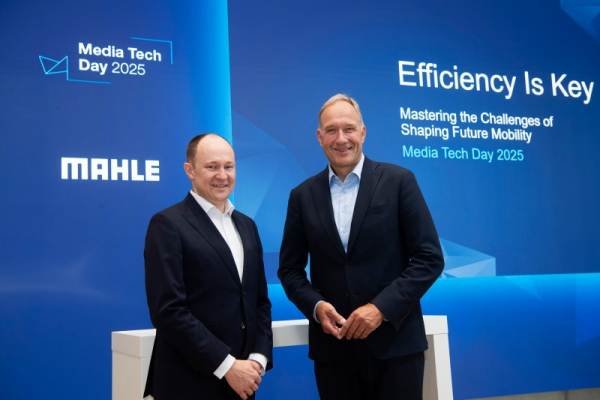ความหลากหลายทางเทคโนโลยีเป็นกลยุทธ์ที่มาห์เล (MAHLE) ยึดถือมาโดยตลอด และยังเป็นรูปแบบที่มีความหวังมากที่สุดว่าจะช่วยลดการปล่อยก๊าซเรือนกระจกได้อย่างรวดเร็วและมีประสิทธิภาพ เนื่องจากระบบขับเคลื่อนยานยนต์ไฟฟ้า (e-mobility) ยังขยายตัวได้ช้า มาห์เลจึงขอเน้นย้ำว่า นอกจากรถยนต์ไฟฟ้าที่ใช้แบตเตอรี่ 100% แล้ว วงการอุตสาหกรรมควรสนับสนุนการใช้เทคโนโลยีที่หลากหลาย ซึ่งรวมถึงระบบไฮบริดและระบบเปลี่ยนน้ำมันเป็นพลังงานไฟฟ้าเข้าสู่แบตเตอรี่ (range extender) โดยอาร์นด์ ฟรานซ์ (Arnd Franz) ซีอีโอของมาห์เล ได้เรียกร้องที่งาน MAHLE Tech Day ณ เมืองชตุทท์การ์ท ขอให้ยุโรปแก้กฎหมายควบคุมการปล่อยก๊าซคาร์บอนไดออกไซด์โดยเร็ว เพื่อให้กฎหมายมีผลครอบคลุมกับเทคโนโลยีการเผาไหม้ที่ยั่งยืนและเชื้อเพลิงหมุนเวียนด้วย
“ในฐานะซัพพลายเออร์ เราต้องการให้กฎหมายมีความเป็นกลางทางเทคโนโลยี (technology neutrality) เพื่อที่เราจะได้เดินหน้าอย่างรวดเร็วในการปกป้องสภาพภูมิอากาศ เพื่อที่ความเชี่ยวชาญและจุดแข็งด้านนวัตกรรมของอุตสาหกรรมยานยนต์ยุโรปจะยังคงเติบโตต่อไปในยุโรป รวมทั้งการรักษาอัตราการจ้างงานในยุโรป และช่วยให้เศรษฐกิจของยุโรปสามารถกลับมาเข้มแข็งได้ดังเดิม”
โดยมาห์เลไม่เพียงมุ่งเน้นปรับปรุงประสิทธิภาพในการนำเสนอผลิตภัณฑ์เท่านั้น แต่ยังให้ความสำคัญกับการปรับปรุงการดำเนินงานทั้งหมดด้วย เพื่อเพิ่มความสามารถในการแข่งขันและสร้างความยืดหยุ่น ท่ามกลางสภาพแวดล้อมทางธุรกิจที่ผันผวนในปัจจุบัน
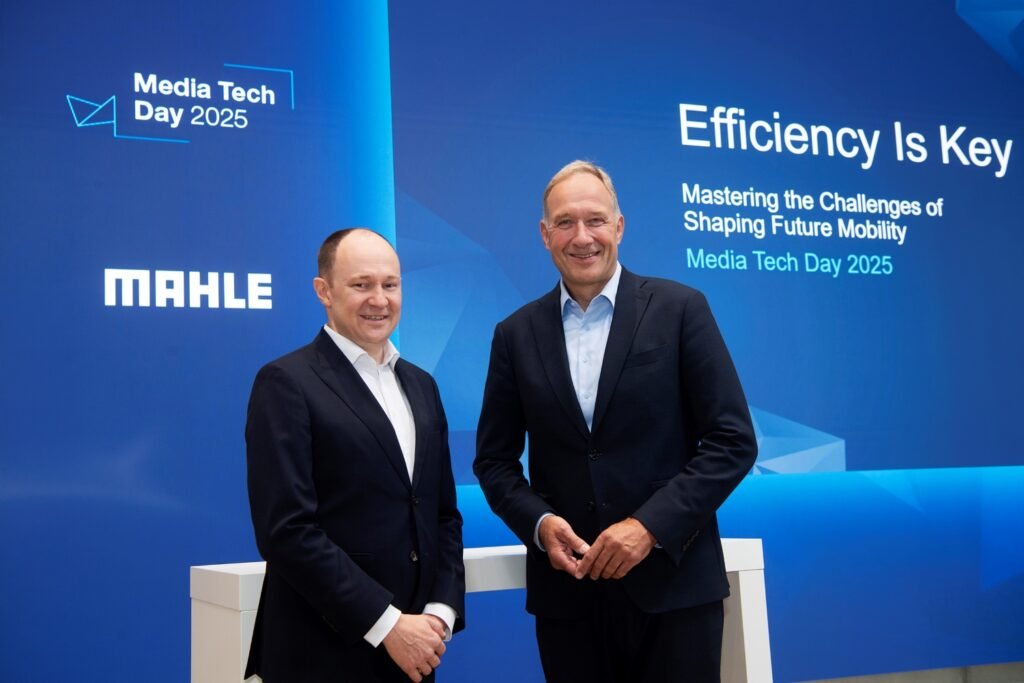
ความเป็นกลางทางเทคโนโลยี เพื่อลดการปล่อย CO₂ และกระตุ้นเศรษฐกิจ
“เรามีความมุ่งมั่นอย่างชัดเจนในเรื่องการปกป้องสภาพภูมิอากาศ และพร้อมผลักดันระบบขับเคลื่อนยานยนต์ไฟฟ้า (e-mobility)” อาร์นด์ ฟรานซ์ ซีอีโอของมาห์เล กล่าวกับนักข่าวจากนานาประเทศ นอกจากผลิตภัณฑ์ไฟฟ้าแบตเตอรี่แล้ว มาห์เลยังลงทุนในระบบไฮบริดและระบบเปลี่ยนน้ำมันเป็นพลังงานไฟฟ้าเข้าสู่แบตเตอรี่เพื่อที่จะทำให้รถยนต์ไฟฟ้าใช้งานได้ในสถานการณ์จริงมากยิ่งขึ้น เทคโนโลยีเหล่านี้กำลังเติบโตอย่างรวดเร็วในประเทศต่าง ๆ เช่น จีน โดยคาดว่า รถยนต์ไฟฟ้าที่ใช้ระบบเปลี่ยนน้ำมันเป็นพลังงานไฟฟ้าเข้าสู่แบตเตอรี่จะมีส่วนแบ่งในตลาดโลกเพิ่มขึ้น 15% ต่อปีจนถึงปี 2573 และมาห์เลมุ่งมั่นที่จะมีส่วนร่วมในการเติบโตนี้
นอกจากนี้ ฟรานซ์ยังเน้นย้ำถึงศักยภาพของเชื้อเพลิงหมุนเวียน โดยกล่าวว่า “แผนการปกป้องสภาพภูมิอากาศในภาคการจราจรทางถนนอย่างรวดเร็วและมีประสิทธิภาพจะสมบูรณ์ไปไม่ได้หากปราศจากเชื้อเพลิงหมุนเวียน ซึ่งนอกจากไฮโดรเจนที่ใช้ในภาคการขนส่งแล้ว เชื้อเพลิงชีวภาพสามารถสนับสนุนการเดินทางส่วนบุคคล (individual mobility) ได้อย่างมีประสิทธิภาพเช่นกัน” เขาเน้นย้ำ
ฟรานซ์กล่าวว่า การที่จะบรรลุเป้าหมายด้านสภาพภูมิอากาศนั้น รถยนต์ที่วิ่งบนท้องถนนจะต้องใช้เชื้อเพลิงชีวภาพและเชื้อเพลิงสังเคราะห์ให้ได้ในสัดส่วนถึง 30% ภายในปี 2573 “เทคโนโลยีของมาห์เลสามารถรองรับการใช้เชื้อเพลิงหมุนเวียนได้โดยตรงอย่างไม่มีข้อจำกัด”
ซีอีโอมาห์เลยังเตือนด้วยว่า สหภาพยุโรป (EU) ได้เดินมาถึงช่วงเวลาที่จะต้องตัดสินใจแล้ว “การปรับปรุงกฎหมาย CO₂ ในยุโรปต้องไม่ล่าช้า เครื่องยนต์สันดาปภายในที่ทำงานโดยใช้เชื้อเพลิงที่เป็นกลางทางสภาพภูมิอากาศ จะต้องได้รับการยอมรับว่าเป็นส่วนหนึ่งของแนวทางแก้ปัญหา” หากไม่มีการสนับสนุนด้านกฎระเบียบ มาห์เลอาจจะระงับการลงทุนในกิจกรรมเกี่ยวกับเครื่องยนต์สันดาปภายใน (ICE) ที่ยั่งยืนในยุโรป
มาห์เลชูกลยุทธ์ MAHLE 2030+ มุ่งเน้นไปที่ระบบส่งกำลังทุกประเภทที่มีส่วนช่วยปกป้องสภาพภูมิอากาศ ไม่ว่าจะเป็นระบบขับเคลื่อนยานยนต์ไฟฟ้า เครื่องยนต์สันดาปภายในที่ยั่งยืน และการจัดการความร้อนเพื่อเพิ่มประสิทธิภาพสูงสุด
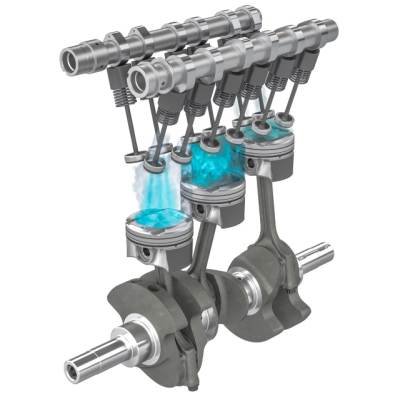
ประสิทธิภาพขับเคลื่อนการเปลี่ยนแปลง
มาห์เลยังคงเดินหน้าปรับปรุงประสิทธิภาพการดำเนินงาน โดยปรับใช้โครงสร้างองค์กรใหม่ทั่วโลกในระยะเวลา 200 วัน เพื่อเพิ่มขีดความสามารถให้กับแต่ละภูมิภาคและเพิ่มประสิทธิภาพการจัดซื้อ และปัจจุบันกำลังดำเนินโครงการ “Back on Track 2025” รวมมาตรการประหยัดพลังงาน เช่น ปิดอุปกรณ์ และการใช้ระบบความร้อนจากเซลล์แสงอาทิตย์
นอกจากนี้ มาห์เลยังส่งเสริมการใช้ปัญญาประดิษฐ์ (AI) โดยนำแมชชีนเลิร์นนิงมาช่วยเพิ่มประสิทธิภาพทั้งการผลิตและการดำเนินงานในสำนักงาน ขณะที่เจเนอเรทีฟ เอไอ ช่วยเร่งการพัฒนาผลิตภัณฑ์ ซึ่งจะเห็นได้จากพัดลมหมุนเหวี่ยงแบบไบโอนิก (bionic radial blower) ที่ได้รับแรงบันดาลใจมาจากปีกของนกเพนกวิน ทั้งนี้สามารถพบกับผลิตภัณฑ์นี้ได้ที่งาน IAA Mobility
มาห์เลเข้าร่วมงาน IAA Mobility 2025
มาห์เลจะจัดแสดงนวัตกรรมในสามด้านหลัก ได้แก่ ระบบเปลี่ยนน้ำมันเป็นพลังงานไฟฟ้าเข้าสู่แบตเตอรี่เพื่อเพิ่มระยะทางขับขี่ของรถยนต์ไฟฟ้า โมดูลการจัดการความร้อนที่รวมฮีทปั๊มในตัว และชิ้นส่วนเครื่องยนต์ที่รองรับเชื้อเพลิงเอทานอลเพื่อลดการปล่อยมลพิษ ซึ่งสอดคล้องกับหลักการ “Efficiency” ที่มาห์เลยึดถือ
ดร. มาร์โก วาร์ธ (Dr. Marco Warth) รองประธานฝ่ายวิจัยองค์กรและวิศวกรรมขั้นสูงของมาห์เล กล่าวว่า “ที่มาห์เล คำว่าประสิทธิภาพไม่เพียงนิยามความสัมพันธ์ที่ยอดเยี่ยมระหว่างความพยายามกับผลลัพธ์เท่านั้น แต่เรายังทำให้หลักการนี้เป็นไปได้ด้วยโซลูชันนวัตกรรมที่ช่วยอนุรักษ์ทรัพยากร ประหยัดพลังงาน และส่งเสริมการเปลี่ยนผ่านสู่การขับเคลื่อนที่ยั่งยืน”
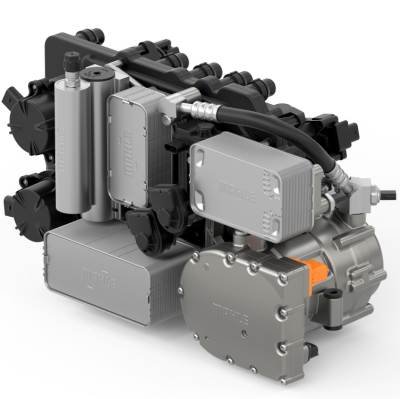
ระบบเปลี่ยนน้ำมันเป็นพลังงานไฟฟ้าเข้าสู่แบตเตอรี่ช่วยส่งเสริมความก้าวหน้าของรถยนต์ไฟฟ้าแบตเตอรี่
ความกังวลเรื่องระยะทางวิ่งเป็นอุปสรรคสำคัญต่อยานยนต์ไฟฟ้า มาห์เลตระหนักถึงความกังวลนี้ จึงได้นำเสนอระบบเปลี่ยนน้ำมันเป็นพลังงานไฟฟ้าเข้าสู่แบตเตอรี่เพื่อให้พลังงานสำรองแก่รถยนต์ไฟฟ้าเมื่อแบตเตอรี่หมด ทำให้สามารถใช้แบตเตอรี่ที่มีขนาดเล็กลงและลดต้นทุน ในขณะที่ให้ระยะทางวิ่งไกลขึ้น
ระบบ 800 V มาพร้อมเครื่องกำเนิดไฟฟ้าประสิทธิภาพสูงกว่า 97% และเครื่องยนต์สันดาปภายในขนาดกะทัดรัดและไฮเทค ที่ใช้เทคโนโลยี Jet Ignition เทอร์โบชาร์จเจอร์ ระบบหัวฉีดไดเรกต์อินเจกชัน และวาล์วควบคุมแบบ Miller cycle ผลลัพธ์ที่ได้คือ ประสิทธิภาพมากกว่า 42% และมีเสียงรบกวนน้อยที่สุด
“ระบบเปลี่ยนน้ำมันเป็นพลังงานไฟฟ้าเข้าสู่แบตเตอรี่ของมาห์เลมีขนาดเล็ก น้ำหนักเบา ติดตั้งง่าย และช่วยประหยัดทรัพยากร จึงเป็นชุดแบตเตอรี่พกพาที่กะทัดรัดและมีประสิทธิภาพเชื่อถือได้สำหรับระบบขับเคลื่อน” มาร์โก วาร์ธ รองประธานฝ่ายวิจัยองค์กรและวิศวกรรมขั้นสูง กล่าว ชิ้นส่วนยานยนต์ที่มาห์เลพัฒนาขึ้นเองนี้ช่วยให้ระบบขับเคลื่อนมีขนาดกะทัดรัด นอกจากนี้ในการทดสอบ WLTP รถยนต์ยังสามารถทำระยะทางได้สูงสุดถึง 1,350 กม.
โมดูลการจัดการความร้อนช่วยเพิ่มประสิทธิภาพและระยะทาง
โมดูลการจัดการความร้อนของมาห์เลประกอบด้วยปั๊มความร้อนประสิทธิภาพสูงที่ช่วยเพิ่มระยะทางของรถยนต์ไฟฟ้าได้สูงสุดถึง 20% การออกแบบที่ครบเครื่องและขนาดที่กะทัดรัดช่วยปรับปรุงประสิทธิภาพและลดต้นทุนของระบบ โมดูลนี้สามารถใช้สารทำความเย็นได้หลากหลาย และจะเริ่มเข้าสู่สายการผลิตได้ภายในสองปี
“ข้อได้เปรียบของมาห์เลในสภาพแวดล้อมการแข่งขันของเราคือ ความเชี่ยวชาญด้านชิ้นส่วนและระบบที่ครอบคลุม ซึ่งเราสั่งสมประสบการณ์เหล่านี้จากการพัฒนาและการผลิตภายในองค์กร ด้วยเหตุนี้ เราจึงสามารถนำเสนอโซลูชันแบบองค์รวมที่ประสานการทำงานได้อย่างสมบูรณ์แบบ” วาร์ธกล่าว
พัดลมหมุนเหวี่ยงแบบไบโอนิก – แรงบันดาลใจจากธรรมชาติ
พัดลมหมุนเหวี่ยงรุ่นใหม่ของมาห์เลได้รับแรงบันดาลใจมาจากปีกของนกเพนกวิน และถูกพัฒนาขึ้นอย่างรวดเร็วโดยใช้เครื่องมือ AI ภายในองค์กร พัดลมหมุนเหวี่ยงแบบไบโอนิกให้เสียงที่เงียบลง 60% และมีประสิทธิภาพสูงขึ้น 15% เมื่อเทียบกับพัดลมแบบดั้งเดิม เหมาะสำหรับพื้นที่ขนาดเล็กในรถยนต์ทุกประเภท
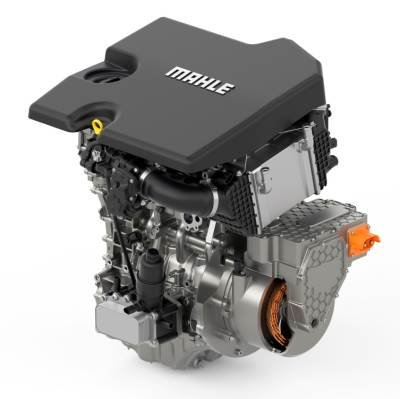
เครื่องยนต์เอทานอล – มาห์เลพร้อมแล้วสำหรับเชื้อเพลิงที่ยั่งยืน
มาห์เลยังได้นำเสนอผลิตภัณฑ์เซลล์พลังงานสำหรับเครื่องยนต์สันดาปภายในที่ใช้เอทานอลเป็นเชื้อเพลิง โดยรถยนต์สามารถลดการปล่อย CO₂ ได้สูงสุดถึง 70% เมื่อใช้เอทานอล E100
พร้อมกันนี้ มาห์เลขอแนะนำชิ้นส่วนเครื่องยนต์ที่รองรับเอทานอล ซึ่งช่วยลดการปล่อย CO₂ ได้สูงสุดถึง 70% และประหยัดเชื้อเพลิงได้ 1.5% ดีไซน์ของชิ้นส่วนนี้ให้ความมั่นใจในเรื่องของความทนทานและกินน้ำมันน้อยภายใต้ความเค้นจำเพาะ (specific stress) ของเอทานอล
– Technology diversity is and remains the strategic approach of MAHLE
– Addition of further sustainable drive system technologies to e-mobility accelerates climate protection
– MAHLE calls for the revision of CO2 legislation in Europe in the near future to take account of sustainable internal combustion engines and fuelsMAHLE CEO Franz: “We need technology diversity in regulations – for climate protection, to strengthen the European automotive industry and to safeguard employment in Europe.”
– At IAA Mobility, MAHLE is showcasing technologies for accelerating electrification and reducing CO2 emissions in road traffic
– Efficiency improvements not only with respect to products but also business processes with a view to boosting competitive strength and resilience
Technology diversity is and remains the strategic approach of MAHLE and the most promising way to reduce greenhouse gas emissions rapidly and effectively. In view of the sluggish ramp-up of e-mobility, MAHLE considers that it is necessary to offer other types of electrification such as hybrid vehicles or range extenders in addition to pure battery-electric vehicles and for politicians to make these options possible. At the MAHLE Tech Day in Stuttgart, CEO Arnd Franz called for the rapid revision of carbon dioxide legislation in Europe to take into account sustainable internal combustion engines and climate-neutral fuels. “As a supplier, we need technology neutrality in legislation. So that we can make rapid progress with climate protection. So that the expertise and innovative strength of the European automotive industry can continue to flourish in Europe. So that jobs remain in Europe and Europe’s economy can recover its old strength.” In a volatile and extremely challenging business environment, the automotive supplier is focusing even more strongly on efficiency improvements – not only with respect to its products but also in its business processes with a view to further strengthening its competitiveness and resilience. At IAA Mobility in Munich, MAHLE is showcasing technologies for accelerating electrification and reducing CO2 emissions in road traffic. IAA Mobility is being held from September 9 to 14, 2025, and the MAHLE stand is located in Hall A1.
Technology neutrality to reduce CO2 emissions and boost the economy
“We have a clear commitment to climate protection. And to e-mobility. We are ready,” Arnd Franz told an audience of international journalists on Wednesday. In addition to products for pure e-mobility, MAHLE is also focusing its efforts on hybrid vehicles and advanced range extenders to boost the ranges of electric vehicles and to make it easier for customers to change over from pure ICE vehicles. Especially China is currently recording strong growth in these electric drive systems. It is forecast that the share of electric vehicles with range extenders in worldwide production of electrified passenger cars and light commercial vehicles will grow by 15 percent per year up to 2030. MAHLE intends to share in this growth.
The MAHLE CEO also mentioned the high decarbonization potential of renewable fuels, which is not yet being fully tapped. “Any plan for rapid and effective climate protection in road traffic is incomplete without renewable fuels. In addition to hydrogen, especially in the transport sector, biofuels can make an effective contribution to individual mobility,” he emphasized. He added that this would allow more rapid progress, especially with respect to the vehicle fleet. The share of renewable fuels, i.e. biofuels and synthetic fuels, used in road traffic would need to rise to 30 percent by 2030 in order to reach the climate goals. “MAHLE technologies already allow the direct use of renewable fuels without any compromises.”
Franz said that Europe was facing a crucial decision for the future with respect to CO2 emissions regulations. “The revision of CO2 legislation in Europe must not be delayed. Internal combustion engines operated using climate-neutral fuels must be recognized as part of the solution.“ In the present regulatory situation, he said that MAHLE as a company was forced to consider a stop of all investments for the expansion and replacement of capacities for sustainable internal combustion engines in Europe. If the EU was not prepared to change its position with regard to a ban on ICE vehicles, such an investment stop would be the logical consequence.
With its MAHLE 2030+ strategy, MAHLE, as a globally active automotive supplier, covers all types of powertrain which can make a key contribution to climate protection: electrification and sustainable internal combustion engines as well as thermal management to boost the efficiency and performance of the two technologies.
Efficiency drives the transformation
In a challenging business environment where trade relations face global uncertainties, MAHLE is increasingly committed to efficiency in connection with the current transition. This also applies to its processes, with a view to enhancing its competitiveness and becoming more crisis-proof.
An example of successful efficiency measures is the new company structure that MAHLE has recently implemented throughout the world from its own resources in only 200 days. This also included the repositioning of purchasing and the strengthening of regional responsibilities with a view to reacting more effectively to customers’ local requirements. The group’s internal cost effectiveness and profitability program “Back on Track 2025” continues to run at full speed. The plants are also working consistently on efficiency improvements. This approach includes initiatives to reduce energy consumption such as the shut-off management of production equipment or the installation of photovoltaic thermal systems.
MAHLE is also expanding the use of artificial intelligence (AI) within the company. The use of machine learning in selected areas optimizes both direct production and indirect processes. Furthermore, generative AI is being put to successful use in product development in order to save time and resources in the development of future-oriented innovations. The most recent development example is the bionic radial blower for air conditioning systems – inspired by a penguin’s flippers – which MAHLE will be showcasing at IAA Mobility.
MAHLE at IAA Mobility 2025
Under the motto of “Efficiency3”, MAHLE is presenting the latest developments in its three strategic areas at this year’s IAA Mobility in Munich: a range extender to boost the range of electric vehicles, a compact thermal management module with integrated heat pump to significantly extend the range of electric vehicles and ethanol-compatible engine components which will considerably reduce both the fuel consumption and the CO2 emissions of internal combustion engines.
Dr. Marco Warth, Vice President Corporate Research and Advanced Engineering at MAHLE, said: “At MAHLE, we not only define efficiency as the optimum relationship between effort and results – we also breathe life into this principle with innovative solutions that conserve resources, save energy and boost the transition to sustainable mobility.”
Range extender system ensures progress with battery-electric vehicles
Many car drivers have a positive attitude to e-mobility. However, it has become clear that they wish to combine the benefits of an electric car with the security offered by additional range. Electric vehicles with range extenders can therefore help to further accelerate the adoption of electric vehicles by relieving consumers’ range anxiety. Range extenders supply energy for the electric motor when the charge of the vehicle battery has been depleted.
The new range extender from MAHLE, which is being showcased for the first time at IAA Mobility, will increase the market acceptance of battery-electric vehicles throughout the world and allow the cost-effective, resource-efficient “rightsizing” of batteries without customers having to accept long waits at battery charging stations on long trips.
The new system, with a rated continuous output of 85 kilowatts (kW), consists of an especially efficient high-voltage generator powered by a compact internal combustion engine. The heart of the 800 V generator is a permanently excited electric generator with a fully integrated cooling system. In addition to a high peak efficiency in excess of 97 percent, this design ensures a high continuous performance density (in excess of 50 kW per liter), minimizing material and space requirements as well as costs. One of the special features of the MAHLE design is the high-performance direct cooling of the rotor, which significantly reduces the need for heavy rare earth elements, among other benefits.
The boosted high-tech internal combustion engine used in the range extender features MAHLE jet ignition combustion technology, direct injection, turbocharging and Miller valve timing, i.e. the special control of the intake valves of an internal combustion engine to allow more efficient combustion and ensure lower pollutant emissions. In range extender operation, the engine offers a high efficiency of more than 42 percent and its noise level is inconspicuous.
“It is small, lightweight, easy to integrate and conserves resources – MAHLE’s range extender is a convincingly compact, efficient power pack for drive systems,” said Warth. The technology toolkit for range extender engines is also supplemented by specially developed engine components such as pistons and valves. In the WLTP (Worldwide Harmonized Light Vehicles Test Procedure), enormous ranges of up to 1,350 km can be achieved, depending on the vehicle and the battery size.
Thermal management module boosts efficiency and range
MAHLE has developed a new thermal management module that boosts the system efficiency of an electric vehicle and therefore also the range available with a battery charge. MAHLE is showcasing the product as a world premiere at IAA Mobility. As the central interface for the entire cooling and refrigerant cycle of the vehicle it ensures that each component of the drive and energy storage system is maintained at the right temperature at all times under all climate conditions at the same time as ensuring a comfortable climate in the passenger compartment.
Especially heating the passenger compartment in the winter is a challenge with electric vehicles. As an electric drive system generates significantly less heat than an internal combustion engine, very little energy from this source is available for heating. The heat required for the passenger compartment must be generated in addition to the operation of the drive system. High efficiency is essential as the energy storage facility of the vehicle is the traction battery. Energy used for heating is not available for propulsion.
To ensure maximum range per battery charge even when heating is needed in the winter, MAHLE has integrated a high-efficiency heat pump in the thermal management module. The module combines air conditioning compressor, heat exchanger, refrigerant pumps, sensors and valves in a single unit. This reduces space requirements, development work and costs. In addition, the overall system is considerably more efficient, allowing the range to be boosted by up to 20 percent compared with a system using electric heaters.
“The advantage of MAHLE in our competitive environment is our comprehensive components and systems expertise developed through our in-house development and production activities. This way, we can offer holistic solutions which are perfectly harmonized with each other,” said Marco Warth.
The module is designed for R1234yf, the refrigerant currently used, but can also be operated with the alternative future refrigerant R290 (propane) with minor modifications. “This provides automakers with security for the future when integrating the system in current vehicle platforms as extensive design modifications will not be needed to change the system over to the new refrigerant,” Warth explained. Thanks to the modular, compact system design, only three refrigerant pumps instead of four will be needed for the vehicle. The system is currently being developed and series production will start within the next two years.
Bionic radial blower – form follows nature
At IAA Mobility, MAHLE is showcasing as a European premiere a ground-breaking radial blower for automotive air conditioning systems that boosts efficiency at the same time as significantly reducing noise levels. This product has been developed especially for vehicles with challenging installation space conditions and takes nature as its model. The aerodynamic shape of the blower blades is inspired by the flippers of a penguin, which glides nimbly and rapidly through the water.
Thanks to its innovative design, the bionic blower is four decibels (dB) or 60 percent quieter than a conventional component. At the same time, its efficiency is improved by about 15 percent as the motor requires less energy as a result of the optimized design. MAHLE is setting new standards with this innovative design. The bionic radial blower can be used in all types of passenger cars as well as light and heavy commercial vehicles.
The development process was considerably accelerated by the use of an in-house AI tool and the first prototypes were produced within a very short space of time. The engineers at MAHLE call this process, in which they guide the AI system and feed it with data and information, “superhuman engineering”. This process created more than 30 million virtual designs in a very short space of time.
Ethanol engine – MAHLE is ready for sustainable fuels
MAHLE underscores its technology diversity in the drive system sector with components for internal combustion engines that can be operated on renewable fuels. Life cycle analyses have shown that carbon dioxide emissions can be reduced by up to 70 percent in operation on pure ethanol (E100).
With a new system consisting of pistons, piston pins and rings, called a “power cell unit”, as well as valve sets, MAHLE has taken into consideration the special requirements for ethanol operation. The optimization of components within the overall system ensures minimum lubricating oil consumption with high resistance to wear, corrosion and thermal stress. The benefits are lower greenhouse gas emissions and the conservation of valuable resources. In addition, the power cell unit allows fuel savings of up to 1.5 percent. This convincingly demonstrates that there is still potential for improvement even after more than 100 years of engine development and that CO2 savings can be achieved.




